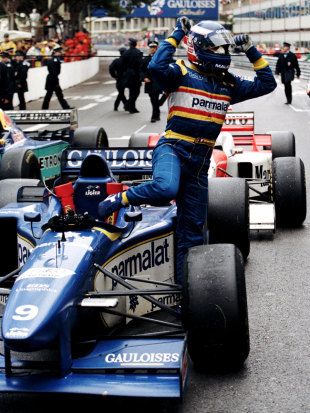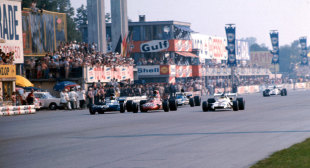
What is the smallest number of finishers in any Grand Prix? asked Mike Salisbury
It seems incredible now, with F1 cars being so reliable, that as recently as 1996 there was a race in which only three cars crossed the finishing line. That year's Monaco Grand Prix started with 21 cars, but a series of incidents and accidents - mechanical or driver-related, and not helped by wet weather - meant that by the closing stages only four cars were running. That dropped to three when Heinz-Harald Frentzen pulled into the pits on the penultimate lap. The three who made it to the chequered flag were Olivier Panis, in a Ligier, who thus claimed his one and only Grand Prix victory, David Coulthard (McLaren) and Johnny Herbert (Sauber). The Finnish Mikas, Salo and Hakkinen, occupied the other point-scoring positions (only first to sixth were rewarded then), but they had taken each other out of the race in a collision five laps from the end.
How many F1 world champions have won the Indy title too? asked Greg Moore
There are two answers to this, depending on exactly what you mean. Five F1 world champions have won the famous Indianapolis 500 race - Jim Clark, Graham Hill, Mario Andretti, Emerson Fittipaldi and Jacques Villeneuve. But four drivers have won the F1 title and the championship usually known as the "Indycar series", which is a season-long competition. They are Mario Andretti (who won three Indycar titles in the 1960s, and the F1 one in 1978); Emerson Fittipaldi (F1 champion in 1972 and 1974, Indycars in 1989); Nigel Mansell (who won the F1 title in 1992 and the Indycar one the following year); and Jacques Villeneuve, who won the Indycar title in 1995 before switching to F1 the following year and winning that title in 1997.
Which type of engine has powered the most Grand Prix victories? asked Howard Cooper
The leader here is Ferrari, whose engines have been behind (and sometimes in front) of 217 Grand Prix-winning cars, the first of them at the 1951 British GP. Ford-engined cars won 176 GPs, many of them with the legendary Cosworth DFV engine, which dominated F1 racing for a long time (12 of the 15 world titles between 1968 and 1982 were won by drivers with Cosworth-Ford engines). The only other engine to have provided more than 100 GP winners is Renault, with 142, although Mercedes is closing in, currently with 88. At the other end of the scale Porsche and Weslake engines have had one GP success apiece.

I think the answer to this tricky poser is the British driver Peter Gethin, who sadly died last December. Gethin's only victory came in a BRM in the Italian GP of 1971, a high-speed slipstreaming affair which, for years, remained the fastest GP ever in terms of average speed (150.75mph). The following year Monza was slowed down a little by the introduction of chicanes. One record that 1971 race does retain, is that it was the closest-ever blanket finish in a Grand Prix: Gethin crossed the line just one-hundredth of a second in front of Ronnie Peterson, with Francois Cevert a further eight-hundredths adrift and Mike Hailwood nine-hundredths of a second further back. Howden Ganley, in another BRM, was just behind them: the first five were separated by only 0.61 of a second. Gethin was ahead at the important moment, but he hadn't led at the end of any of the previous laps, and indeed never led at the end of any lap of his 30-race F1 career.
Now all the 2012 teams have been finalised, who will be the most experienced driver on the grid and who are the rookies? asked Andy Foster
The most experienced driver on the grid in 2012 in terms of races will be - no surprise here - Michael Schumacher, who has so far raced in 288 GPs. Only Rubens Barrichello, who failed to find a seat for 2012, has ever taken part in more (326). Next to Schumacher comes Jarno Trulli, with 256 GPs: Jenson Button (210) is the only other current driver with more than 200. The grid for the Australian GP should also include two F1 debutants: the French pair of Charles Pic, in a Marussia (formerly Virgin), and Jean-Eric Vergne, in a Toro Rosso. (This assumes there are no late changes to the announced teams.)
I suppose the most famous tyres of all, to British eyes, are Dunlops. Have they ever been used in F1? asked Ronnie Bailey
Dunlop tyres were widely used in the first 21 years of the world championship: cars using them won 83 GPs - the last in 1970 - and eight world championships. Their last drivers' title came in 1969, when Jackie Stewart's Matra was fitted with Dunlops. The last GP win by a Dunlop-shod car was by Pedro Rodriguez's BRM, in Belgium in 1970. Since then, though, Dunlop tyres have only been spotted in F1 racing in the Japanese GPs of 1976 and 1977, when a local entrant used them.
If you want to ask Steven a question, use our feedback form. The most interesting questions will be answered here every other Friday. His long-running Ask Steven column on Cricinfo remains one of that site's most popular features
© ESPN Sports Media Ltd.
 If you want to ask Steven a question, use our feedback form. The most interesting questions will be answered here every other Friday. His long-running Ask Steven column on Cricinfo remains one of that site's most popular features Ask Steven features a number of experts, headed by Steven Lynch, who answer your questions across Formula One as well as a variety of other sports
If you want to ask Steven a question, use our feedback form. The most interesting questions will be answered here every other Friday. His long-running Ask Steven column on Cricinfo remains one of that site's most popular features Ask Steven features a number of experts, headed by Steven Lynch, who answer your questions across Formula One as well as a variety of other sports

